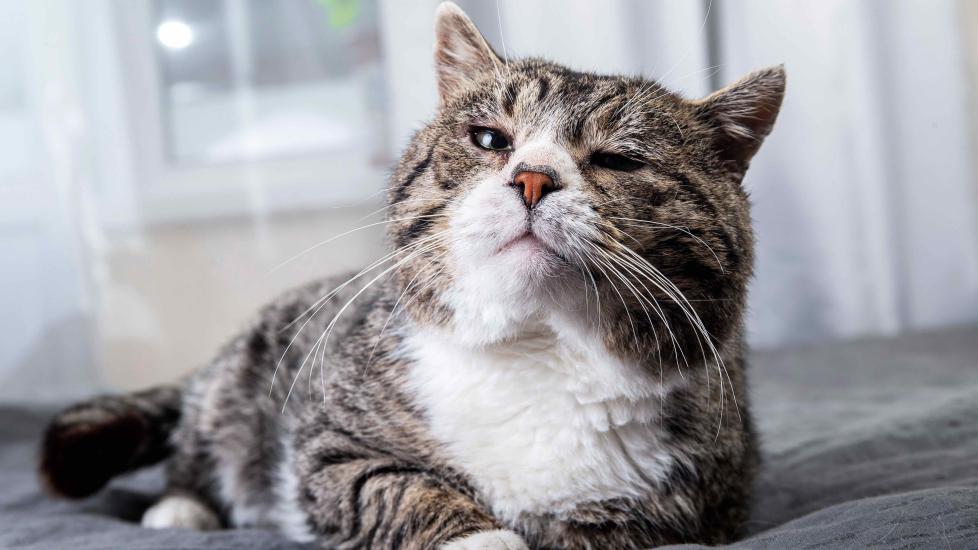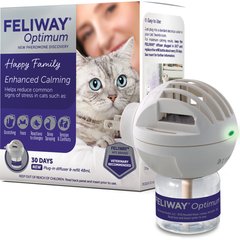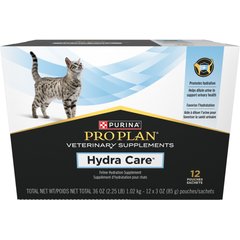10 Signs Your Cat Is Aging
Although they can often live well into their teens, cats are considered senior when they reach 10 years old. As a cat ages, there are normal biological processes that begin to take hold. But sometimes what seem like minor changes can actually represent an underlying health problem.
Here are some of the common signs of aging in cats and what you should do if you notice them in your kitty.
1. They Spend More Time Resting
Sure, adult cats already spend about 16 hours sleeping every day. But when they reach their senior years, you may notice your cat resting even more. As these hours of sleeping get longer, you may also find that your kitty is more difficult to wake up—especially if their hearing and vision aren’t as sharp as they used to be. These are typically considered normal changes during the aging process.
But if your kitty seems stiff and sore when they get up or is having trouble making jumps or going up and down stairs, talk to your vet because health conditions may be a concern.
Vet Recommended Health Support
- Feliway Optimum Enhanced Calming 30 Day Diffuser for Cats$29.99Chewy Price
- Purina Pro Plan Veterinary Diets FortiFlora Powder Probiotic Digestive Supplement for Cats, 30 count$30.99Chewy Price
- Purina Pro Plan Veterinary Diets Hydra Care Liver Flavored Liquid Supplement for Cats, 3-oz pouch, case of 12$14.99Chewy Price
- Purina Pro Plan Adult Sensitive Skin & Stomach Lamb & Rice Formula Dry Cat Food, 7-lb bag$28.08Chewy Price
2. They Develop Dental Disease
Even relatively young cats—often as young as 4 or 5 years of age—will develop dental disease. After all, if you didn’t brush your teeth for years, you’d expect dental problems, too!
But even with routine brushing, problems can still develop with time. Signs of dental issues in cats can include:
-
Reluctance to eat
-
Chewing on one side of their mouth
-
Dropping food when they eat
Your veterinarian should assess your cat’s teeth as part of every wellness exam, which should be every six months for a senior cat. Most cat dental problems are curable, especially when found and treated early. Almost 100% of cats will develop dental disease by the age of 5, so it’s an important issue to be aware of and address.
3. Their Appetite Changes
Senior cats should maintain their weight; neither weight gain nor weight loss is normal in cats as they get older. But their appetite may vary somewhat to help maintain their weight as their metabolism shifts. So, a senior may eat a little more or a little less than previously to maintain their normal frame.
If you notice that your kitty is suddenly eating significantly more or less than normal, this can be a sign that problems are developing and that you should visit your veterinarian. Weight gain is less common and generally not an immediate concern for senior cats. But being overweight can also contribute to health problems and is still something to address.
4. They Lose Weight
Even with a healthy appetite, many senior cats begin to lose weight. If your senior cat is losing weight, it’s cause for concern. Visit a vet sooner rather than later.
Your vet may conduct blood work to determine why your cat is losing weight. Many causes of weight loss, such as an overactive thyroid or diabetes, are very treatable in cats. It’s best to discover any underlying conditions as soon as possible so they can be promptly treated.
5. They Have Trouble Jumping
Many older cats will lose muscle as they get older. This can make their hind end look thin and contribute to trouble jumping or climbing stairs.
There can be several reasons why this happens, including metabolic disorders or arthritis. Any time your cat is starting to have trouble getting around, it’s important to determine why and whether the condition is painful. Cats have a very high pain tolerance and are not likely to let you know when they are uncomfortable; they tend to leave subtle clues that they’re in pain, such as not jumping.
6. They Don’t See or Hear as Well
Often, we aren’t aware that our cat is losing their sight or hearing until the signs are clear. For example, if they start bumping into objects and furniture, or if they don’t react to things they formerly found scary (like fireworks or the vacuum).
This is typically part of the normal aging process for cats. However, if your cat seems to suddenly go blind (especially if their eyes look to be dilated), this can be due to a medical emergency, and you should take them to the vet immediately.
Cats can occasionally have bouts of high blood pressure, especially if they are experiencing thyroid or kidney disease. These episodes of hypertension can damage the small blood vessels in the eye, resulting in sudden blindness. The best hope of treating this condition is through early diagnosis and aggressive treatment.
7. They Seem Restless or Yowl a Lot
Restlessness and frequent yowling are not common in older kitties. These signs can represent either a behavioral or medical change.
Cats can experience several medical conditions that cause yowling and restlessness. If you are seeing your cat do this, it’s time for an exam and a blood panel to screen for issues. Cats can also develop some changes in their cognitive function as they age, which cause similar behaviors.
8. They Drink More Water
Although you might think it’s a good thing to drink a lot of water, in cats it’s a very common sign of medical problems such as kidney disease or diabetes. Don’t wait to go to the vet if you’re having to fill your senior cat’s water bowl more than normal.
9. They Get Cranky
Many older kitties get more irritable, especially if awakened from a deep sleep or handled when they don’t want to be. This could be an extension of their normal personality—in other words, a normally grumpy cat can become downright cranky with age. It could also be something new, and a normally mellow cat can suddenly seem out of sorts.
While this can be normal, it can also be a sign of discomfort or pain (such as from arthritis). Have your veterinarian routinely screen your senior cat for painful areas.
10. Their Nails and Coat Need Extra Care
Many older animals get a little lazy with their personal hygiene. This is very common and largely considered normal, though some conditions (such as arthritis) will make it more difficult for cats to groom themselves well.
Most senior cats will need extra attention to their coat, including regular brushing and mat removal. They may also stop biting their toenails, resulting in the nails becoming too long. Weekly trimming will help with this.
Waxy ears can also be a problem for senior felines, leading to ear infections. Cleaning your cat’s ears on a weekly or biweekly basis can help you avoid future medical issues.
With lots of TLC, it isn’t unusual to see cats reach 20 years old. But proper care is key to helping your cat reach their golden years!
Featured Image: Adobe/Alexandr




